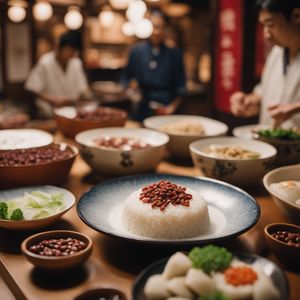
Dish
Loukoumi geroskipou
Loukoumi geroskipou is a popular sweet in Cyprus and is often served as a dessert or snack. The candy is made by combining sugar, water, and starch in a pot and cooking it over low heat until it thickens. The mixture is then flavored with rosewater or lemon juice and poured into a pan to cool. Once the candy has set, it is cut into small squares and dusted with powdered sugar. Loukoumi geroskipou is a simple and delicious treat that is perfect for satisfying a sweet tooth.
Origins and history
Loukoumi geroskipou has been a popular sweet in Cyprus for centuries. It is believed to have originated in the town of Geroskipou, which is located in the Paphos district of Cyprus. The candy is often associated with religious festivals and is a common offering at weddings and other celebrations.
Dietary considerations
Loukoumi geroskipou is suitable for people following a gluten-free or vegan diet. It does not contain any animal products or gluten.
Variations
There are many variations of loukoumi geroskipou, including those that are flavored with orange or mint. Some recipes also call for the addition of nuts or dried fruit.
Presentation and garnishing
Loukoumi geroskipou is typically presented on a plate or in a decorative box. It is often garnished with fresh flowers or herbs to add a pop of color and flavor.
Tips & Tricks
When making loukoumi geroskipou, it is important to cook the mixture over low heat to prevent it from burning. It is also important to let the candy cool completely before cutting it into squares. If you want to add nuts or dried fruit to your candy, make sure to stir them in gently to avoid breaking up the candy.
Side-dishes
Loukoumi geroskipou is typically served as a standalone dessert or snack. It can be enjoyed with a cup of coffee or tea.
Drink pairings
Loukoumi geroskipou is often enjoyed with a cup of coffee or tea.
Delicious Loukoumi geroskipou recipes
More dishes from this category... Browse all »

Aamras
Indian cuisine

Aasmi
Indian cuisine

Agra petha
Indian cuisine

Aiyùbīng
Taiwanese cuisine

Ajdnek
Slovenian cuisine

Akafuku
Japanese cuisine

Akanés
Greek cuisine

Akumaki
Japanese cuisine




